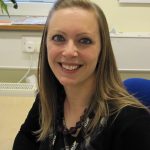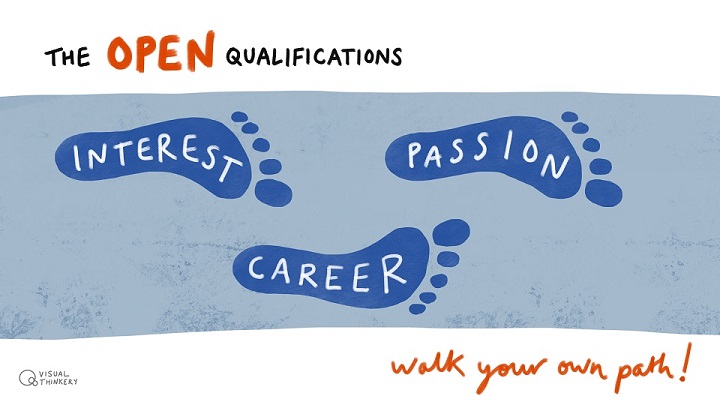 Helen Cooke is a Senior Manager in Curriculum Innovation and responsible for the day-to-day running of the Open Programme. She is a Senior Fellow of the Higher Education Academy (SFHEA) based on her work supporting multidisciplinary students in an online environment.
Helen Cooke is a Senior Manager in Curriculum Innovation and responsible for the day-to-day running of the Open Programme. She is a Senior Fellow of the Higher Education Academy (SFHEA) based on her work supporting multidisciplinary students in an online environment.
Buzzwords are pretty common these days, especially in higher education. In fact, it’s rare for me to get through a working day without being introduced to a new one, and as such, they don’t often stick in my consciousness. But every now and then, all it takes is one single word to change your perspective and help you see things in a whole new light…
 This happened to me last year when I stumbled across Emilie Wapnick’s fabulous book How to be everything. Not only has the word in question been a revelation to me in a professional context but it has forced me to reflect on, and appreciate, how my own learning journey has resulted in me finding a job that I love, and ultimately a better understanding of my place in the world.
This happened to me last year when I stumbled across Emilie Wapnick’s fabulous book How to be everything. Not only has the word in question been a revelation to me in a professional context but it has forced me to reflect on, and appreciate, how my own learning journey has resulted in me finding a job that I love, and ultimately a better understanding of my place in the world.
Now I realise these may sound like grand claims and you’re probably starting to ask yourself how one little word could possibly make such a difference to someone’s outlook on life? Well, for a start, it’s not such a little word – a whole 17 letters in fact…
…I’m a multipotentialite.
Not in the ‘gifted’ sense of the word, where the term has traditionally been used to describe children with incomprehensible intelligence in many subjects, but because I have a genuine curiosity and passion for many (many) things.
Even though I chose to study a straight Geography degree at university, I discovered that as much as I loved wading around in rivers and studying avalanches in the Swiss Alps, I was equally fascinated by modules on consumerism and international development (much to my surprise) and my dissertation topic was focused on gender and tourism.
So, does this make me a “jack of all trades”, unable to apply myself to one specialist area? Does my choice of degree mean that I will never know enough about other subjects to fully succeed in the workplace? Well, if career is measured by job satisfaction and ‘learning gain’ (another current buzzword in higher education), then finding a career that suits my multipotentialite skills and interests has made me as successful as any multimillionaire.
Of course, some might argue that I have become a “specialist” after all. Working in higher education on a truly unique undergraduate degree programme – and now fascinated by applying concepts like multipotentiality to my work – is actually turning me into a specialist in interdisciplinary and multidisciplinary education. But I’m not an academic, teacher or research scientist. Nor am I a straightforward project manager, administrator or student support adviser. At different times during my working day, I’m any one (or more) of these things. My job requires me to know as much about finance, marketing, and politics (internal and external) as it does about technology enhanced learning, social media and curriculum development. I once even taught myself to use a computer program written in French.
But I still haven’t even got to the best bit yet…
Whether or not they identify themselves with the term as much as I do, I’m surrounded by other multipotentialites!
With almost 25,000 students studying towards an Open qualification at The Open University, that’s almost 25,000 individual study journeys, 25,000 personalised qualifications and an unimaginable number of different module combinations. It’s simply mind-blowing (and very difficult data to analyse!). Not only am I constantly amazed at the commitment, tenacity and perseverance of these students to balance their studies with busy, challenging lives, but their wide-ranging interests and motivations continue to fuel my new-found multipotentialite interests by simply making their own choices and finding their own way in the world.
As individuals, we all have the opportunity to make our own choices and choose what is right for us at any given moment in time. As education providers, we need to ensure that there are learning opportunities that are focused enough for the specialists amongst us, and flexible enough to accommodate those whose strengths lie in studying across different disciplines.
At the end of the day the most important skill that any of us can learn is how to learn – and how to keep on learning.
